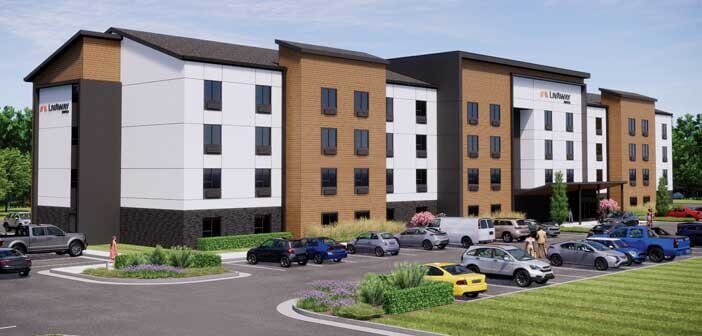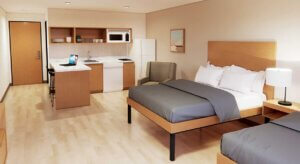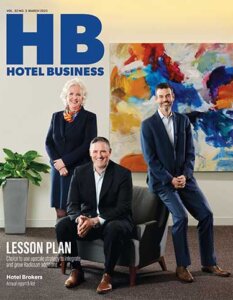A new player has entered the extended-stay landscape this month as the first LivAway Suites property broke ground outside of Nashville.
“We are a brand-new, independent, economy, extended-stay lodging brand,” said Kevin Dailey, COO, LivAway Suites. “We’re going to play in—if there was such a segment—upper-economy or premium-economy. That’s pretty much where we’re going to live. So, if you think of Extended Stay America in the midscale space, and maybe a WoodSpring Suites or the new ECHO [Suites Extended Stay by Wyndham] in the economy space, we’re going to position ourselves right in between where we think there is a supply gap in that sweet spot that we’re looking to capitalize on.”
The new-build properties will have single-room suites, 400 sq. ft. on average, with full kitchens and Scandinavian-inspired design. “Think of the light wood, and the bold or more contemporary finishes,” he said. “Think of the more residential experiences, where there is a multiuse island—it could be used for work or meals or watching TV.”
Dailey, who in his 34-year career has been an executive with LaQuinta, Motel 6, Accor and Red Roof, began to think about the concept in mid-2020. “My partners and I have a master development agreement with West 77 Partners,” he said. “They have been developing economy extended-stay hotels now for 10 years. I was running a third-party management company in 2020, and we specialized in economy extended-stay—we had 120 hotels—and when the rest of the industry was really struggling, extended-stay was proving the resiliency of the model. That inspired the initial conversations.”
With his experience in the industry and throughout the pandemic, they realized that their idea could catch on. “There is a lot of opportunity here, not just for increased supply, but demand has far outpaced the supply growth in the segment for many years,” he said.
This first hotel is one of seven or eight corporate-owned properties that will be breaking ground this year, and Dailey said the company expects to launch a franchise platform later this year, adding, “We plan on having 10-15 corporate sites a year for the next several years.”
“We are definitely going to lead by example here,” he said. “We want to prove our concept. I am an old-school hotelier, back to when [most]brands had skin in the game. I know from experience in my interactions with developers in the franchise communities I have had the pleasure of working with that that matters. That is a statement.”
The fact that all of the properties will be new-builds gives his brand an advantage, said Dailey. “Most of the economy extended-stay in this country—let’s just face it—is a little tired, a little long in the tooth,” he said. “With a 100% new-build platform, coupled with some smart guest-facing technology that we’re incorporating, we think we’re going to offer a pretty unique product.”
While the company is not creating any proprietary technology on its own, it is partnering with a number of providers for areas like a self-serve guest check-in experience, smart parcel lockers for package delivery and the guest laundry room. “We are not reinventing the technology wheel, but when you think about all of the different technology ingredients that are out there in the marketplace for anybody right now, we are picking and choosing as smartly as we can with the guest—and developers—in mind to create a new recipe that will be very unique in the marketplace,” he said.
The company is already under contract with 30-plus sites. It worked with The Highland Group to find the best markets for the brand. “They established 25 KPIs, and ran every market in the country through their KPI matrix, and came back with 100 sites that they recommended,” said the COO. “So, we got to work. We whittled the list down a little bit more, so we could get working on a list that was a little bit more manageable.”
Future sites for the brand include Daytona Beach, FL; San Marcos, TX; Missoula, MT; Syracuse, NY; and three sites in Salt Lake City. “One of the beauties of this model is that you don’t have to be directly in downtown Nashville to thrive,” he said. “You can be in a secondary market or suburb and thrive. The cost of land and everything associated with the barriers to entry in the downtown area are negated. You get the benefit of a more economical area, and the overflow from a city like Nashville.”



